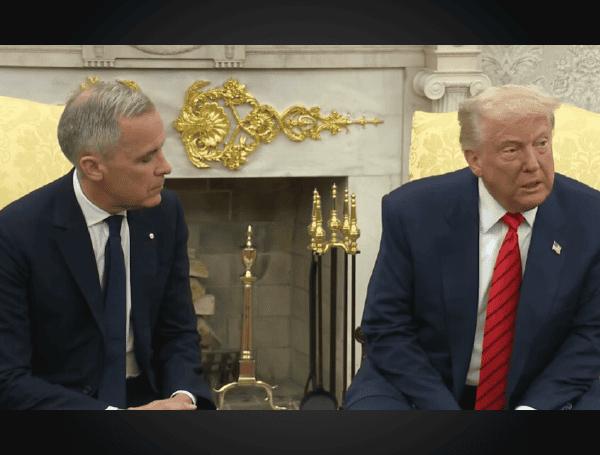Canadian Prime Minister Mark Carney met with U.S. President Donald Trump on Tuesday, delivering a firm message that Canada “is not for sale,” nor will it ever be. The strong declaration came during a testy exchange where President Trump revived his idea of Canada potentially becoming a U.S. state.
President Trump has repeatedly made remarks that are interpreted as threatening Canadian sovereignty, a stance that has become a significant political issue in Canada.
READ: Florida Rep. Cammack Intros ‘App Store Freedom Act’ Targeting Apple, Google’s Mobile Dominance
Prime Minister Carney’s Liberal Party notably saw a resurgence in popularity during the recent Canadian election campaign, largely by rallying against Trump’s annexation suggestions.
President Trump told reporters, “Never say never,” in reference to the idea of Canada becoming part of the U.S. Prime Minister Carney’s response was unequivocal: “Never,” he repeated.
During their first meeting, Trump reiterated his long-held belief that Canada would be better off as the 51st U.S. state.
“I do feel it’s much better for Canada,” Trump said, adding that while it “takes two to tango,” the U.S. wouldn’t be discussing it unless Canada initiated the conversation. He described the potential union in glowing terms, calling it a “wonderful marriage.”
READ: Bernie Sanders Says Democrats Need A Working-Class Agenda, Slamming Trump Is ‘Not Good Enough’
Carney, who had previously campaigned forcefully against such notions, repeatedly rejected the suggestion during the meeting.
The leaders also touched on the ongoing dispute over U.S. tariffs on Canadian goods. President Trump indicated that nothing offered by Prime Minister Carney on Tuesday would lead him to lift the tariffs. “That’s just the way it is,” Trump stated plainly.
Prime Minister Carney framed the tariff issue within a broader context. “This is a bigger discussion,” he responded. “There are much bigger forces involved, and this will take some time and some discussions, and that’s why we’re here, to have those discussions.”
The U.S. tariffs, particularly those targeting Canadian manufacturing like automobiles, are seen by analysts as a long-term strategy by the Trump administration to pressure companies to relocate production back to the United States. Trump’s comment to Carney about not wanting cars made in Canada underscores this objective, suggesting tariffs are a tool to achieve that goal.
Please make a small donation to the Tampa Free Press to help sustain independent journalism. Your contribution enables us to continue delivering high-quality, local, and national news coverage.
Connect with us: Follow the Tampa Free Press on Facebook and Twitter for breaking news and updates.
Sign up: Subscribe to our free newsletter for a curated selection of top stories delivered straight to your inbox.
